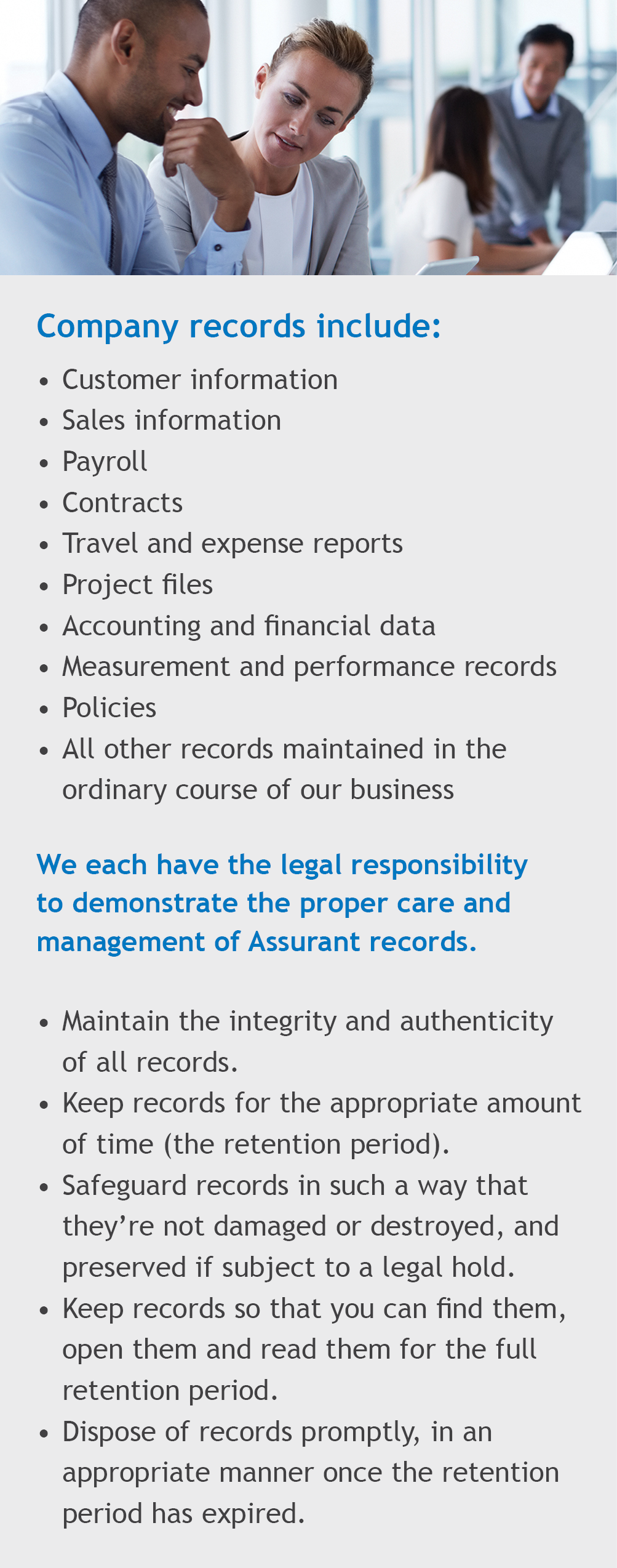Responsibility to Assurant and
OUR SHAREHOLDERS
As a publicly traded global company, we have a duty to protect Assurant assets, systems, records, information, interests, and our company name to maintain the trust our shareholders have placed in us and keep our company strong and thriving.
Protecting Intellectual Property
Innovative ideas and solutions are a central factor in Assurant’s success. We respect and protect the copyrights, patents, trademarks, confidential information, and intellectual property of Assurant, as well as those of our clients, business partners, competitors, suppliers, and customers, consistent with contractual terms, and regulatory and legal requirements.

> Our Responsibilities
- We only use our intellectual property for legitimate Assurant business purposes, never for personal gain, personal use, or for nonbusiness purposes.
- We only use or share Assurant’s intellectual property with people outside Assurant when proper controls are in place.
- We ensure we have the appropriate rights and permissions before using third-party materials.
- We protect Assurant’s brand and logo and use them with the relevant policies and guidelines in mind
including the Global Intellectual Property Policy.
Frequently Asked Questions
We each have the responsibility to properly manage and preserve Assurant records in accordance with the Records and Information Management Policy and the Global Records Retention Schedule.
- Maintain the integrity and authenticity of all records.
- Keep records for the appropriate amount of time (the retention period).
- Safeguard records in such a way that they’re not damaged or destroyed and are preserved if subject to a legal hold.
- Keep records so that you can find them and access them for the full retention period.
- Dispose of records promptly, in an appropriate manner once the retention period has expired.
- For additional information and guidance, please reach out to the records and information management office at
[email protected].
Protecting Confidential Information
Customers, suppliers and companies with whom we do business trust us to be good stewards of their confidential informationInformation that you acquire, receive, learn, create, develop or have access to because of your employment at Assurant and that’s not made readily available to the public. Please refer to the Assurant Information Classification Guide for more information., whether that information relates to financial, personal or business matters. We respect and protect this data with care and diligence.
> Our Responsibilities
- We handle our confidential information with care and avoid discussions in public places or with others who don’t need to know.
- We maintain confidentiality even if we stop working for Assurant and return confidential information before leaving.
- We respect the confidentiality of our business partners, customers, suppliers, and former employers and don’t use their information without prior legal approval. We understand that nothing in the Code prevents us from reporting possible legal or regulatory violations to relevant government officials.
Frequently Asked Questions
Don’t disclose any confidential information of a prior employer unless it’s already been made public through no action of your own.
Before disclosing confidential information:
- Be sure you're permitted to do so under applicable law, regulations and company policies and procedures.
- Disclose it only to those who are authorized to receive it and who need to know it to do their job.
- Limit the amount of information shared to what is required to achieve the stated business purpose.
- Obtain an Assurant-approved Confidentiality Agreement, Nondisclosure Agreement, or other agreement with appropriate company-approved privacy clauses (if required) when sharing it with someone outside Assurant..
- Make sure the recipient knows that the information is confidential, and any restrictions related to its use or dissemination. If the information is received or shared in consultation with Assurant's legal representatives, seek guidance from Legal before sharing with others.

Information Technology and Cybersecurity
We’re responsible stewards of Assurant’s technology resources. Our information technology is critical to our operations and allows us to work more effectively to meet our business objectives. These resources belong to Assurant, and we use them responsibly and securely to protect against cybersecurity threats and vulnerabilities.

> Our Responsibilities
- We only use Assurant-authorized hardware, software and other IT services.
- We protect and secure the data on our laptops and other devices when traveling on business or working remotely.
- We exercise good judgment when using company-provided technology resources and prevent unauthorized access to Assurant information.
- We don’t use Assurant resources to engage in inappropriate communications or access sites that are offensive, illegal or obscene.
- We follow the guidelines in the Acceptable Use and Information Security policies including reporting security incidents promptly.
Frequently Asked Questions
Safeguarding Our Assets
Whether it’s financial, records and information, technology, or physical property, our assets are a valuable aspect of delivering on our promises to our customers. We each have the responsibility to safeguard them against fraud, theft, loss and abuse.
> Our Responsibilities
test- We honestly and accurately document and report financial transactions, consistent with internal controls, applicable laws, regulations and accounting practices.
- We protect Assurant resources from fraud The use of deception with the intention of obtaining an advantage, avoiding an obligation or causing loss to another party. Internal fraud includes any effort by an employee to deprive Assurant or its customers and partners of any assets by theft, deception or other corrupt means., waste and abuse as well as report any suspect activities immediately.
- We protect company assets (e.g., Assurant-owned computer, corporate credit card) from misuse, loss, damage, cybersecurity threats or theft.
- We’re committed to maintaining accurate company recordsA record is any documented information (in any media like paper or digital) that’s necessary to satisfy the needs of Assurant’s business operations, legal and regulatory requirements, fiscal responsibilities and historical needs. and accounts. Review the Records and Information Management policies for additional information.
- We follow the Raising and Reporting Concerns Policy and immediately report any suspected fraud or embezzlement, or any form of dishonesty by an employee, client, customer and/or other third party.
Artificial Intelligence
Assurant is committed to technological innovation that improves the lives of our clients, customers, employees and other stakeholders. We believe that the responsible and ethical use of AI has the potential to favorably revolutionize the way we live and work, and we’re committed to earning and maintaining the trust of all stakeholders through the use and delivery of ethical AI solutions.
> Our Responsibilities
- We’re committed to AI solutions that don’t perpetuate discrimination or biases and inequalities, and that are equitable for all individuals regardless of race, gender, religion, sexual orientation, ability, or other protected categories.
- We’re committed to complying with all applicable laws and regulations, contractual commitments, and company policies governing intellectual property rights and the collection, use, and storage of personal data and confidential and proprietary information in our AI Solutions.
- We’re committed to providing clear explanations of how our AI systems work and disclosing their use, as required by law and as otherwise appropriate while respecting confidentiality obligations and our intellectual property and data security interests and those of third parties. We won’t tolerate any use of AI technologies for malicious purposes, misinformation, or propaganda.
- We’ll hold ourselves accountable for our actions and decisions as to our use of AI technologies, including verifying results where needed and rectification of harmful impacts or unintended consequences as appropriate. We’ll consider the insights of relevant personnel, technical disciplines, and business units in the administration of AI technologies and the oversight of the same.
Insider Trading
We recognize that, through the course of our work, we may become aware of material, nonpublic information about Assurant or another company with whom we do business. We maintain trust with our investors and the public by complying with Assurant’s Insider Trading Policy and securities laws, including insider trading laws, which means we don’t trade in the securities of Assurant or another company if we’re aware of material, nonpublic information about Assurant or learn of such information through our employment at Assurant.
We guard this sensitive data and don’t use it for financial and other benefit, and strictly forbid the sharing of this information. Employees and others who are subject to the company’s Insider Trading Policy should refer to the policy for more information.
> Our Responsibilities
- We follow our Insider Trading policy and laws, including applicable preclearance procedures and blackout policies as applicable.
- We never buy or sell stocks based on material, nonpublic information (inside information) about Assurant or other companies learned through the course of our work with Assurant.
- We protect the confidentiality of Assurant’s nonpublic information and only share with other Assurant employees on a need-to-know basis.
- We don’t give someone else a tip to buy or sell securities of any company while having material, nonpublic information.
- We don’t share material, nonpublic information outside Assurant unless there’s a need to do so and legal protections, such as a Confidentiality Agreement, are in place.
- We recognize that any employee, officer, director, consultant, or other independent contractor of Assurant who violates insider trading laws or our Insider Trading policy will be subject to appropriate disciplinary action up to and including termination, and may also be subject to criminal, civil or other penalties.
Before engaging in any transaction that could be deemed insider tradingInsider trading involves trading in a public company’s stock by someone who has material, nonpublic information about that stock. Insider trading can be either illegal or legal depending on when the insider makes the trade. Generally, it’s illegal when the material information is still nonpublic., you should carefully consider how enforcement authorities and others might view the transaction. If you have any questions about the propriety of any transaction in the company’s or any other company’s stock, bonds or other securities, consult with a Securities Officer identified in the company’s Insider Trading Policy or the Chief Legal Officer before undertaking the transaction.
Frequently Asked Questions
Avoiding Conflicts of Interest
We’re each responsible for objective and unbiased decision-making in our work on behalf of Assurant. A conflict of interestA conflict of interest may occur when your personal interests or the activities you perform on behalf of Assurant interfere (or appear to interfere) with the company’s, a shareholder’s or a client’s best interest. A conflict can arise when you take action or have interests that make it difficult to perform your company work objectively. can arise when our personal interest interferes — or even appears to interfere — with the interests of Assurant and may make it difficult to perform our work objectively and effectively.
> Our Responsibilities
- We avoid actions and decisions that create, or even appear to create, a conflict of interest with Assurant.
- We never use our position at Assurant for improper personal gain.
- We don’t improperly use Assurant resources or influence because even the perception of a conflict of interest may have negative consequences.
- We consult the Conflict of Interest Policy for additional guidance.
- When potential conflicts of interest arise, we disclose them promptly through the Conflict of Interest Disclosure process.
Frequently Asked Questions
Potential Conflict of Interest Situations to Disclose
- Working with a relative at Assurant
- Having a relative work for an Assurant vendor or client
- Working with, or for, a competitor of Assurant
- Starting a business that competes with Assurant
- Working or consulting outside Assurant
- Owning a substantial financial interest in an Assurant vendor or client
- Dating or having a romantic relationship with a supervisor or subordinate
- Serving on a board or trade association
See the Conflict of Interest policy for more information.
Gifts, Entertainment, and Hospitality
We’re committed to winning business on the quality of our products and service. Business courtesies, which include anything of value, such as gifts, meals, or entertainment, can strengthen working relationships with our business partners. But gifts, meals or trips that are extravagant or lack transparency or a legitimate purpose may be viewed as bribes or as simply inappropriate, and erode trust and harm our business.
Note: SSO enabled. After clicking, enter your Assurant email address and click SIGN IN. Don’t enter a password.

> Our Responsibilities
- We don’t give or ask for business courtesies to influence the other person or organization to do something in return.
- We limit giving or receiving business courtesies to what is reasonable and appropriate under the circumstances and avoid frequent gifts to or from the same person or organization.
- We obtain approval and follow the Gifts, Entertainment, and Hospitality Disclosure process as required.
- Note: SSO enabled. After clicking, enter your Assurant email address and click SIGN IN. Don’t enter a password.
- We don’t offer, promise, make, or authorize the giving or receiving of anything of value to/from a government official (including employees of state owned/controlled companies) that’s inconsistent with our Code and Anti-Bribery and Corruption Policy and only after prior written regional Compliance approval.
- If we make charitable donations on behalf of Assurant, we do so in accordance with Assurant policy to support legitimate charitable causes. Requests for donations to be funded by the Assurant Foundation should be submitted here.
- See the Assurant Cares portal on Connect for additional information on employee volunteering, donations, and matching gifts. The Assurant Foundation matches employee donations to charities. Click here for specific guidelines.
- Prohibited or unwanted business courtesies may be donated to the Assurant Foundation by contacting [email protected].
- Gifts given or received must be disclosed and approved prior to giving or accepting, per the Gifts, Entertainment, and Hospitality policy.
- Subject to local restrictions, it’s permissible to give and receive retail, food establishment or similar reputable business gift cards (including e-gift cards or gift certificates) valued at $25 or less per recipient. Under no circumstance may we accept or offer gifts of cash or cash equivalents such as general-purpose gift cards (e.g., Visa, Mastercard, American Express) from or to anyone who does or may seek to do business with Assurant.
Gift Policy
In your capacity as an employee, officer, or director, you may accept a non-cash gift, including a meal or entertainment, that:
- Is reasonable in value
- Is a part of the normal business process
- Is lawful
- Is given or accepted infrequently
- Cannot be construed as a bride or payoff, or as an attempt to influence you
- Reflects good taste and judgment
Please see the Anti-Bribery and Corruption Policy and Gifts, Entertainment, and Hospitality policies for additional information. Please contact [email protected] for information on how to donate a gift to the Assurant Foundation.

Policies
- Acceptable Use and Information Security policies
- Anti-Bribery and Corruption policy
- Compliance and Legal policies
- Conflict of Interest policy
- Insider Trading policy
- Raising and Reporting Concerns policy
- Records and Information Management policies
- Social Media policy
- Media and External Communication Policy
- AI/ML Governance policies
Resources
- Assurant Information Classification Guide
- Brand Guide
- Conflict of Interest Job Aid
- Convercent Job Aid
- Employee Stock Purchase Plan (ESPP) Brochure
- Gifts, Travel and Entertainment Job Aid
- Information Security Job Aid
- Information Security Website
- Insider Trading Job Aid
- Protecting Data While Working Remotely
- Open Generative Artificial Intelligence Technology (Open GAIT)
- Social Media Infographic
When in Doubt - Speak Up
If you have questions or concerns, let your manager, the People Organization or the Ethics Office know.


Social Media and Communicating Externally
Social media is an integral part of our lives and a valuable tool to connect with others internally (Connect, Engage, etc.) or externally (Facebook, X, etc.) and should be used in accordance with the Social Media Policy and the Media and External Communication Policy. Further, our communications externally influence how Assurant is perceived in the markets and regions where we operate and by the consumers and communities we serve. We provide clear and accurate information and are careful not to disclose confidential information.
> Our Responsibilities
Frequently Asked Questions
A general rule to remember when using social media is to think about the impact of statements that you make. Keep in mind that these transmissions are permanent and easily transferrable, and can affect our company’s reputation and relationships with coworkers and customers. When using social media, don’t make comments on behalf of Assurant without proper authorization. Also, you must not disclose Assurant’s confidential or proprietary information about our business, suppliers or customers.
If you’re unsure of how these policies may apply to your social media activities, contact the Social Business team: [email protected]
We adhere to unwavering standards of integrity, ethics, governance, privacy and information security.